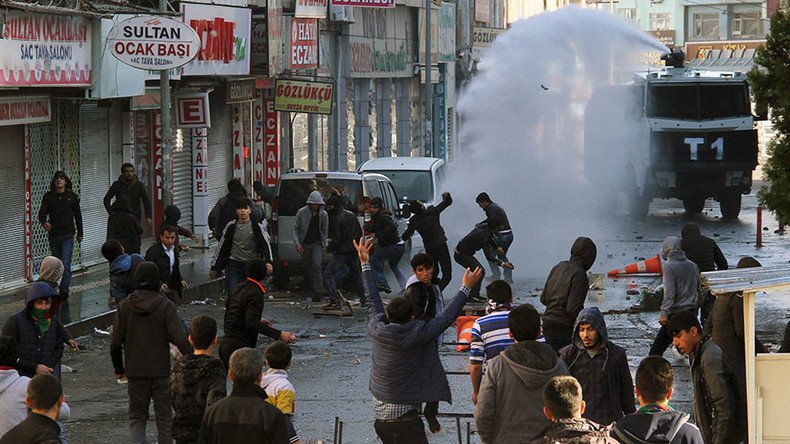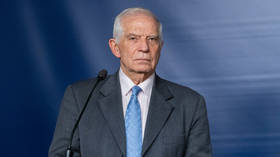Turkish Kurds demand autonomy as Ankara continues crackdown in southeast

A congress of Kurdish non-governmental organizations has called to grant autonomy to Turkey’s southeastern regions via constitutional reform, as Turkish forces continue their crackdown on the Kurds.
On Sunday, the Democratic Society Congress (DTK), an association of Kurdish non-governmental organizations, adopted a declaration stressing the need for Kurdish self-rule in Turkey after a two-day special meeting in Turkey’s southeastern city of Diyarbakir.
"The rightful resistance mounted by our people against the policies that degrade the Kurdish problem, is essentially a demand and struggle for local self-governance and local democracy,” the 14-article declaration said.
Turkish military crackdown, curfews force 200,000 civilians flee Kurdish southeast – report https://t.co/DtNrYbvclQpic.twitter.com/AuxVtoLnNv
— RT (@RT_com) December 26, 2015The document suggests the creation of autonomous regions on Turkey’s territories mainly inhabited by Kurds, which could be composed of one or several Turkish provinces.
The autonomous regions should have their own elected legislatures and governments. Central government should have no power to remove the elected members of these bodies. Additionally, the regions should also have their own security forces under control of the regional authorities.
The DTK declaration also stresses that an autonomous region should receive a share from the use of natural resources located on its territory, and says constitutional reform is needed to formalize these norms in legislation.
No crackdown on Kurds! Thousands in Germany protest against Turkey’s military op (VIDEO) https://t.co/teZOnA4wV6pic.twitter.com/dr25XWa5Lc
— RT (@RT_com) December 27, 2015The congress emphasized that granting autonomy is the only way for both to ensure the democratization of Turkey and to resolve the Kurdish issue in Turkey, adding that Kurds will not stop fighting for self-rule.
“We are extending our hand [for a peaceful settlement of the Kurdish issue] for the last time. We will not give up [demanding] autonomy,” Selma Irmak, a co-chair of the DTK said, delivering a speech on the first day of the Congress, Today’s Zaman reports.
The Congress expressed its commitment to the peaceful settlement of the Kurdish issue calling for reopening dialog and re-launching negotiations. It also reiterated its call for the release of Abdullah Ocalan – the leader of the outlawed Kurdistan Workers’ Party (PKK).
16 people die during 11-day Turkish army crackdown on Kurdish forces in Cizre – report
https://t.co/iFwWDaOZh1pic.twitter.com/Bm3AQwgtJs
— RT (@RT_com) December 24, 2015The co-chair of the pro-Kurdish Peoples' Democratic Party (HDP), Selahattin Demirtas, said Kurds may potentially not only have autonomous regions, but also an independent federal state in the future. In his speech at the Congress on Saturday, he said the 21st century would be the “century of the Kurds.”
President Recep Tayyip Erdogan ruled out any possibility of another state within Turkey’s borders.
"Now they are talking about separating our land in this country. We will never allow surgery on the unity of our country," he said on Saturday as quoted by Reuters.
Also on Saturday, Prime Minister Ahmet Davutoglu canceled a scheduled meeting with the HDP and accused the party of seeking “polarization in the country.” The PM was reacting to HDP politicians’ recent statements, in which they criticized the government’s crackdown on Kurds and demanded its cessation before any meeting between the HDP and the government could take place.
Turkish PM cancels meeting with pro-Kurdish HDP party, accuses it of ‘appealing to clashes' https://t.co/zpmJbdknwEpic.twitter.com/tio0VZePsl
— RT (@RT_com) December 26, 2015Turkey’ security operation in the country’s southeast continues with heavy fighting in the towns of Cizre and Silopi. More than 200 Kurdish fighters have been killed in the operation over the last two weeks, according to an army statement issued on Saturday.
A two-year ceasefire between the Turkish government and Kurdish militants fell apart in July, reigniting the three-decade conflict that has already claimed the lives of more than 40,000 people.












